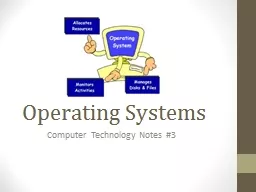PPT-Introduction to Computer Systems
Author : tatiana-dople | Published Date : 2016-03-15
1521318243 spring 2009 27 th Lecture Apr 30 th Instructors Gregory Kesden and Markus Püschel Today Races deadlocks thread safety Multicode Thread Level Parallelism
Presentation Embed Code
Download Presentation
Download Presentation The PPT/PDF document "Introduction to Computer Systems" is the property of its rightful owner. Permission is granted to download and print the materials on this website for personal, non-commercial use only, and to display it on your personal computer provided you do not modify the materials and that you retain all copyright notices contained in the materials. By downloading content from our website, you accept the terms of this agreement.
Introduction to Computer Systems: Transcript
Download Rules Of Document
"Introduction to Computer Systems"The content belongs to its owner. You may download and print it for personal use, without modification, and keep all copyright notices. By downloading, you agree to these terms.
Related Documents














